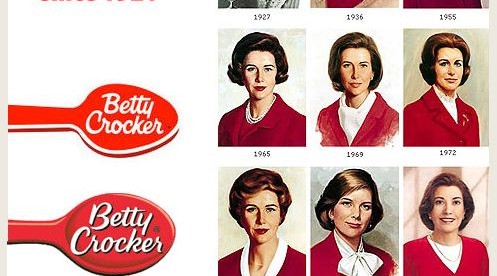The Life and Lies of Betty Crocker


If you’d like to make a cake (or in the above example, “low-fat fudge brownies”), it’s as simple as buying a box of Betty Crocker cake mix, putting in some pretty basic ingredients — water, vegetable oil, and an egg — mixing, and baking. Some amount of time later — about 30 to 40 minutes — you’ll have dessert, hot from the oven. It’s a pretty cool deal, and it’s what helped make Betty Crocker a household name.
And it’s also based on a pair of lies.
Betty Crocker was born in 1921 in Minnesota — kind of. The Washburn Crosby Company — a predecessor to food giant General Mills — ran a contest in which anyone who completed a jigsaw puzzle depicting a scene from one of their mills (vaguely designed to look like a flour sack when put together) could write in to win a pincushion. (Yes, a pincushion.) Despite the humdrum prize, the giveaway proved popular, and Washburn Crosby had a good problem on their hands: people, typically women, were not only writing in to claim their pincushion, but also for baking advice. Seeing these letter-writers as likely customers for their Gold Medal brand flour, Washburn Crosby’s fledgling customer service department replied with baking tips. And to make the tips seem more genuine, the company decided to sign the letters “Betty Crocker” — Betty, because per Wikipedia, it “was viewed as a cheery, all-American name” and Crocker, after the name of one of the company’s board members. But Betty Crocker never existed.
Shortly thereafter, the fake letter author would gain a voice. Washburn Crosby purchased a local, failing radio station in 1924, and one of the first shows the company introduced was the “Betty Crocker Cooking School of the Air,” hosted by none other than Betty Crocker (as far as listeners knew). The show, despite the lie, did very well, and other stations wanted the show. Washburn Crosby — which likely saw the show as great marketing — decided to distribute the show in a low-cost way. The company, per its own corporate history, sent scripts to radio stations who were to, in turn, record the audio themselves, using local talent. Perhaps as an unintended side effect, depending on where one listened to the “Betty Crocker Cooking School of the Air,” Betty could have a different accent — making her sound like someone who could be in your neighborhood.
But what Betty sounded like wasn’t the only thing that changed. Here’s a collection of images showing what Betty Crocker looked like over the years, and you’ll note that she’s (a) ageless and (b) updated to remain somewhat contemporary (if not reserved) every few years:

But the fact that Betty never existed — and is designed to provide a false sense of familiarity — isn’t the bigger of the two lies. The bigger lie?The egg. It didn’t have to be there.
Cake mixes have been around since the 1930s — here’s the patent for the first “process of making a dehydrated flour mixture”, which is what cake mix basically is. Powdered eggs — that is, dehydrated eggs — have been around since 1912, and many early cake mixes contained powdered eggs. But in the 1950s, Betty Crocker cakes required that you add a fresh egg at home. As cake mix companies are selling convenience, why make the impromptu baker do any extra work or shopping? According to the UK website of Betty Crocker, it’s because market research told them to do it: “Research conducted by psychologist Ernest Dichter proved that being able to add an egg to a cake mix, rather than just using powdered egg, took away the guilt of convenient baking and affirmed the woman’s role as provider.”
That, as it turns out, is also a bit of a lie — the idea that adding an egg made the product more psychologically viable was around for nearly twenty years beforehand, per this 1933 patent application (via Bon Appetit). To speculate a bit, it’s likely that General Mills saw the patent, decided to test the assertion, and once the patent ran out, decided to use the “add an egg” angle as a marketing hook.
So you only have to add an egg because the company wants you to feel good about your cooking skills. But the joke’s on General Mills: You’re a better cook than Betty Crocker, because at least you exist.
Bonus Fact: Betty Crocker isn’t the only liar in the food world. Far from it! So here’s another example. If you like blueberries, peaches, or strawberries in your oatmeal, Quaker Instant Oatmeal has a few choices which sound appealing — blueberries and cream, peaches and cream, and — you guessed it — strawberries and cream. Sounds like a perfect fit for your fruit preferences, right? Wrong. None of the three actually contain any of the fruit advertised. All three use “flavored fruit pieces” or “flavored and colored fruit pieces,” but the “fruit” are either apples or dates with artificial flavors of the fruit named on the box. (Here’s the peaches and cream box, if you want to take a look, and to be fair to blueberry fans, that option also has “blueberry juice concentrate.”)
From the Archives: Swedish Lemon Angels: The baking recipe you can’t make at home. Or anywhere else. (The YouTube link on that doesn’t seem to work any more, sorry.)
Take the Quiz: Name these words that sound like they start with eggs, but don’t.
Related: Betty Crocker low-fat fudge brownie mix. Just because it’s a lie doesn’t mean it doesn’t taste good.
